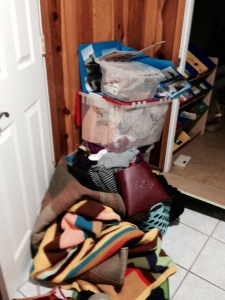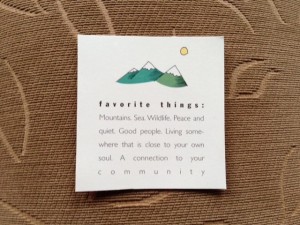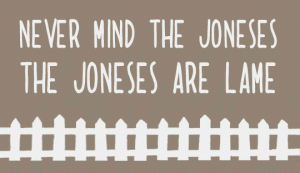My husband started it. He started clearing out drawers and cabinets. Sorting, organizing, purging. At first I just rolled my eyes. Then I kinda got into it. The pile in the photo above was taken when he was emptying a room in our house that had started to fill up with clutter. His way is to empty the space first and clean then deal with the pile later. Not my method, makes me crazy, but the results are good. I cleaned out kitchen drawers, cabinets and the pantry. Then I got to thinking, why does taking a carload to the Goodwill feel so fucking good? And why does that pile make me want to scream and run into the street like a crazy person? And another thing, how are those people who work at Goodwill so absolutely nice and polite? They are going through other people’s crap all day long and they still have time for a wink and a smile and a have a nice day. These people are the true heroes. You need to go there and hug them.
Here’s what we do when we notice that things are starting to get cluttered. First, we ignore it. We close the door. We tell ourselves that we might eventually find that other earring or wear that ugly dress. We couldn’t possibly discard a ticket to Italy that we might someday use in a scrapbook. This line of thinking, it seems to me, is a trap. It keeps us stuck and unable to move on. Letting go of something is liberating. All that stuff is heavy, literally and emotionally. It weighs us down.
But here’s the bugaboo. What we keep says something about us. About who we are, where we’ve been and what we believe to be special and important. Getting rid of those things is hard. It’s emotionally taxing. So here’s what I have found to work: First, do not have too much coffee. It makes you jittery and edgy and likely to throw a fit that everyone is trying to make your life miserable and disorderly. Or maybe that’s just me. (Coffee, I’m sorry. See you in the morning?). Second, start a de-clutter project when you have a buffer day before you have to go back to work. Or you will never get that shit done and the PILE will stare at you every day that you can’t do a damn thing about it. Third, get yourself some inspirational jams or podcasts. I like to go back and forth between the two. And last, stay in your pajamas if humanly possible. As soon as you get dressed, it’s like putting on reality and who needs that shit. Get lost in it.
Also, if just the sheer joy of spreading sunshine at Goodwill wasn’t enough, your brain does not like clutter. Physical clutter in your environment has been shown to not only negatively affect your ability to process information, it also affects your ability to focus. You know how your daughter is talking to you and all you can see are those wet dirty soccer socks on the floor and it’s all blah blah blah until you go and pick them up? Your brain’s visual cortex sees the clutter, wants to do something about it because it’s so damn distracting and then can’t process any outside information. The longer the clutter hangs around, the more taxed your brain becomes and the more likely you are to express your resentment in not-so appropriate ways. According to the study in the Journal of Neuroscience, when there is clutter present, you will be more irritable, less productive, more distracted and significantly less able to mulit-task. In other words, to be the best “you” you can be, get rid of it. No therapist required.
Want even more good reasons to say goodbye to your 80’s cassette tape collection? When you clear a space, even if it’s just your counter or your desk, it frees space in your brain for creativity and problem solving. In my family, they know that if the counter is not cleaned off, mom is not happy. Just that simple act of cleaning off the counter can take me from Def Con 5 to Def Con 1 (watch WarGames if you don’t get the reference). Plus, when you do get to clean out a drawer (or cabinet or closet or room-you overachiever) you then have the beautiful task of wiping with freshly scented cleaner and reliving the good feeling for days afterward by just opening the drawer (or cabinet or door) and gazing upon your goddamn glorious hard work.
Then there’s the magic. Magic, you ask? In cleaning? Yes. The magic in the finding of the long lost or long forgotten object. For me, I had asked my kids to remove photos from about a 100 frames that we were donating. It was fun to reminisce about all the photos. But I came across something that I had framed that was not a photo. I cut it out from a card that a friend sent me when my husband and I had moved here more than 10 years ago. It said: Favorite things: Mountains. Sea. Wildlife. Peace and quiet. Good people. Living somewhere that is close to your own soul. A connection to your community.
Wow. What a great reminder of who I am, why I am here and why we all matter.












